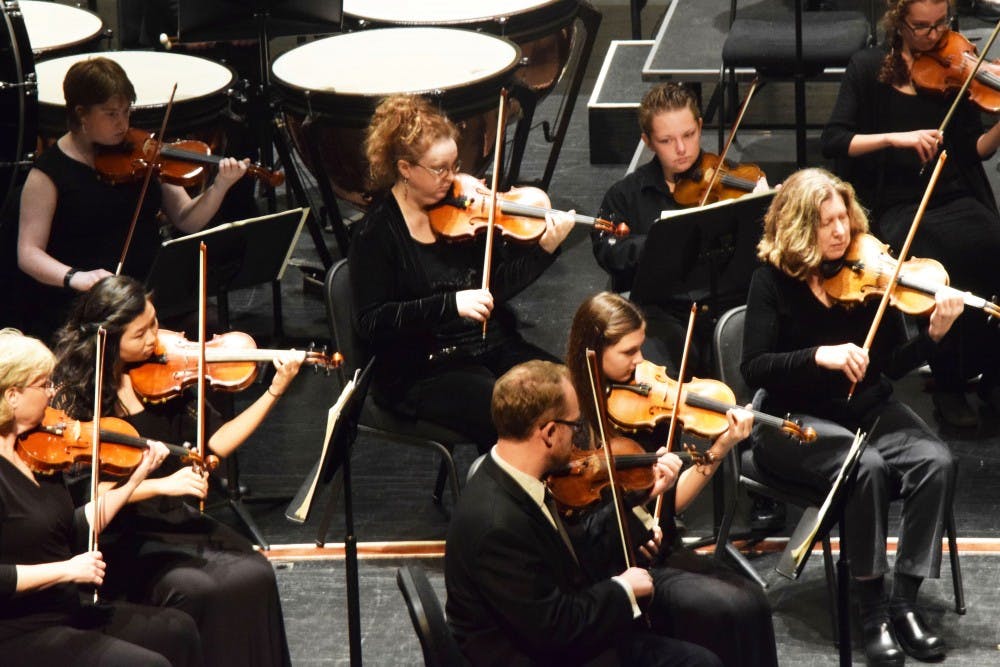Shakespearean music filled the H. Ric Luhrs Performing Arts Center on Sunday afternoon as the Shippensburg University Community Orchestra performed “Music for Shakespeare.”
Directed by Mark L. Hartman, the performance offered the audience a taste of the classical music which is featured in plays written by Shakespeare, such as “The Merchant of Venice” and “Romeo and Juliet.” Along with the orchestra, the performance also featured guest musicians and actors who provided narratives, solos and skits.
As the last of the audience members filtered through the doors of the auditorium, the musicians on stage tuned their instruments, resulting in a cacophony of clashing sounds. However, once the lights dimmed and the conductor took his place on stage, with a wave of his baton he emitted a slow, smooth rising tone from all of the musicians. With a flick of the wrist, the conductor silenced the musicians and the real show began.
The first piece played was titled “Overture to a Midsummer Night’s Dream.” From the play of the same title, the piece of music was composed by Felix Mendelssohn and represents various themes within the play. The playbill describes the opening chords as “magically effective” which are then followed by the fairy-like theme in E minor. The piece also includes a “gently sentimental theme for the lovers” and a “very lively portrayal of the rustics.”
The overall feel of the first piece was both light and lively, with the sound of pretty flutes leading the audience into the piece at the beginning and the same flutes leading the audience out of the piece at the end.
The next piece was titled “At Shakespeare’s Tomb.” This portion of the performance featured the orchestra as well as a narrator, otherwise known as a libretto, and tenor soloist. Paris Peet, an actor and SU professor of theater, acted as libretto while cellist Matthew Peck served as the soloist. As the orchestra played, Peet performed various excerpts from Shakespeare’s plays and sonnets. The purpose of Peet’s role is to explore Shakespeare’s deep understanding of the human condition and encourages the audience to truly experience the richness of life, according to the playbill. Accompanying Peet and the orchestra was the rich tone of Peck’s voice as he sang intermittently with Peet’s dialogue.
The performance continued with the orchestra playing a piece titled “Music for Shakespeare,” sans accompaniment of a soloist and libretto. Peet made yet another appearance as libretto after “Music for Shakespeare,” performing an excerpt from Act IV, Scene One from “The Merchant of Venice.” Peet spoke with great emphasis and power, his voice rumbling through the auditorium evoking the audience’s attention.
Following Peet was the orchestra and soloist Elizabeth Lins Shoenfelt in a piece titled “Shylock.” The vocal part was originally written for a tenor soloist, but Shoenfelt, choir director and SU assistant professor of music, performed it beautifully in soprano. Her voice carried so well out over the audience that Shoenfelt did not require a microphone. Reaching bars unimaginable for most people, Shoenfelt’s voice brought the work together for a sweet-sounding piece of music.
The performance closed with a skit from the infamous play “Romeo and Juliet,” followed by a piece titled “Romeo and Juliet Suite.” The skit was from Act I, Scene Five where Romeo, played by Travis Dasher, sees Juliet, played by Mackenzie Brouse, for the first time at a party held at the House of Capulet. Unaware of the tragic fate to fall upon them, Romeo and Juliet share two kisses before Juliet is called away, and the scene ends. Following the skit, the musicians raised their instruments for a final time. “Romeo and Juliet Suite” had both a passionate and tragic sound, which was very fitting for the context of the play. The piece illustrated Romeo and Juliet’s fiery love for one another while also encapturing the devastating fate the star-crossed lovers were destined to face.
With final bows from the conductor and musicians, “Music for Shakespeare” concluded and audience members filed out of the auditorium with the sweet sounds of string and brass instruments still ringing in their ears.


The Slate welcomes thoughtful discussion on all of our stories, but please keep comments civil and on-topic. Read our full guidelines here.